Super Tuesday: Everything you need to know
It’s all or nothing for the Democratic presidential candidates as they prepare for the most important day in the primary race so far: Super Tuesday. Here’s what it means and why it’s so important.
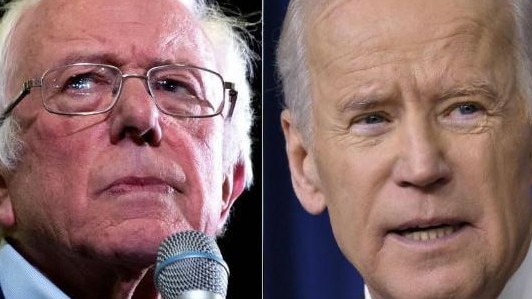
Leaders
Don't miss out on the headlines from Leaders. Followed categories will be added to My News.
The countdown is on for America’s biggest election day – until actual election day in November – with voters from Maine to California casting their ballots in Super Tuesday polls for the Democratic candidate who will take on US President Donald Trump.
Close to 130 million voters live in the 14 polling states, more than 10 times the population of the four states that have already voted – and a number of factors have combined to potentially make this the most influential Super Tuesday in history.
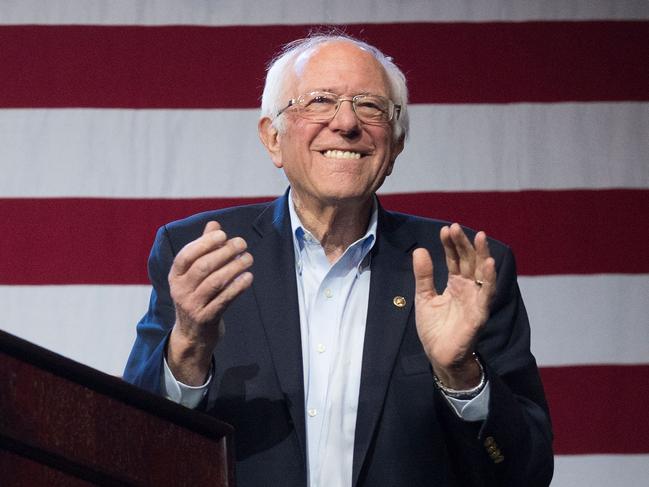
Primary contests in Iowa, New Hampshire, Nevada and South Carolina have dictated the Democratic narrative so far, pitting far left candidate Bernie Sanders against the moderate former vice president, Joe Biden for the number one spot.
But while these early polls have dominated the US news cycle, they have only accounted for four per cent of the potential vote, as opposed to the March 3 primaries, which offer more than a third of the available delegates.
It comes as Minnesota’s Amy Klobuchar on Monday (local time) withdrew from the race to support fellow moderate, Mr Biden.
Super Tuesday also marks the official entry to the race of billionaire Michael Bloomberg, the former New York mayor who stood out of the February polls to focus on the March contest, with a staggering, record political ad spend of nearly $A700 million.
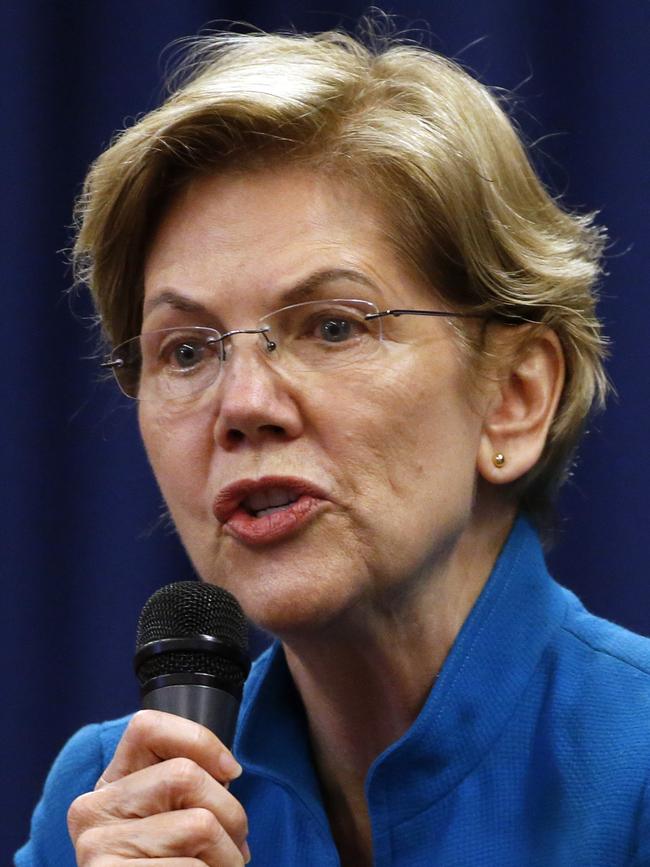
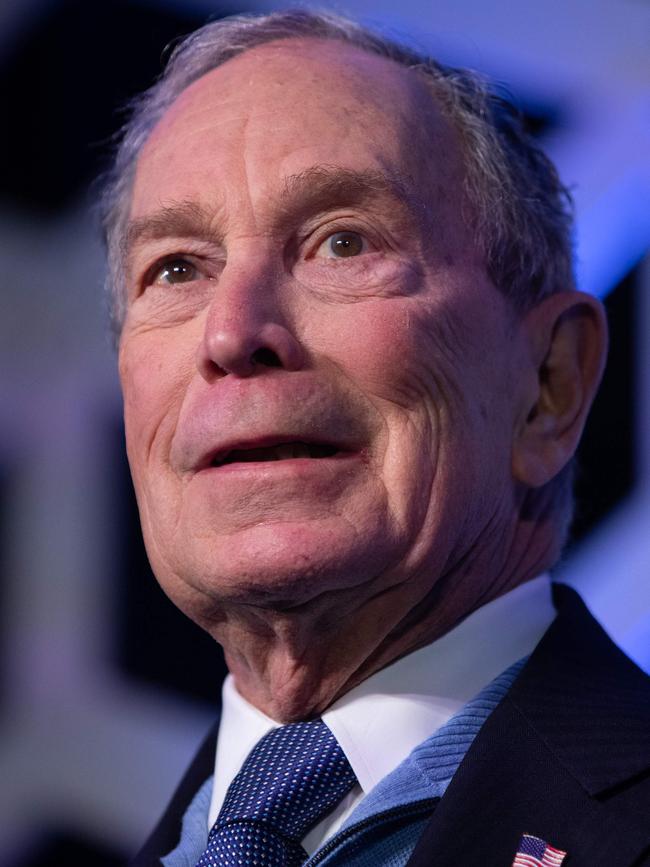
His unconventional campaign has seen him polling in the mid tier, but he hasn’t actually been electorally tested.
Adding even more punch to today’s result is the fact that California, America’s most populous state, has moved its primary to the front of the cycle, voting for the first time on Super Tuesday rather than in the traditional June.
The eventual presidential nominee will be decided on the number of delegates they amass, rather than the number of raw votes they receive.
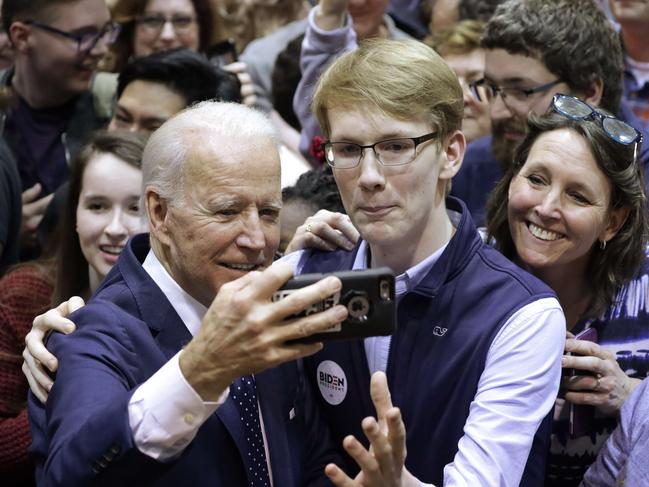
So far just 155 delegates have been awarded (60 to Mr Sanders, 53 to Mr Biden), but there are a hefty 1357 on the table for Super Tuesday, some 34 per cent of the potential delegates.
The magic number to win the nomination is 1991, and there are 2467 delegates available in remaining primaries until June 6.
The two most closely watched states today will be California, which holds 30 per cent (415 delegates) of today’s potential delegates and has drawn the heavy focus of Mr Sanders and Mr Bloomberg, and Texas, with 228 delegates and a minority-white vote up for grabs.
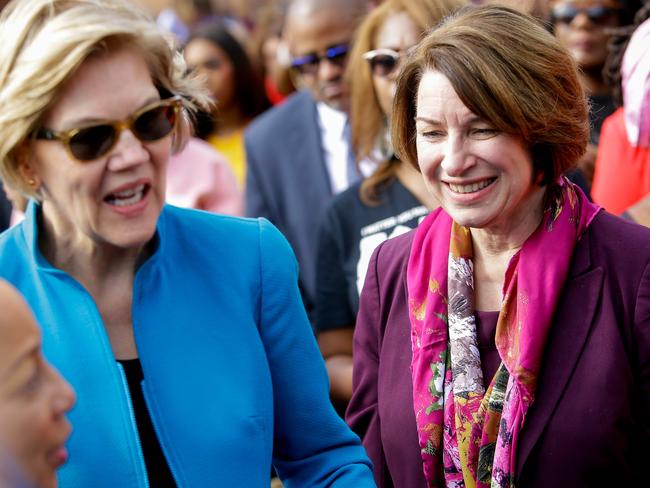
The 2020 primary season started with a record Democratic field and today’s vote will winnow it further, following the departure of Klobuchar, Washington outsider and former Indiana mayor, Pete Buttigieg, and billionaire Tom Steyer after disappointing form in South Carolina.
With Klobuchar exiting and throwing her support behind Mr Biden, Senator Elizabeth Warren presents the biggest progressive challenge to Mr Sanders.
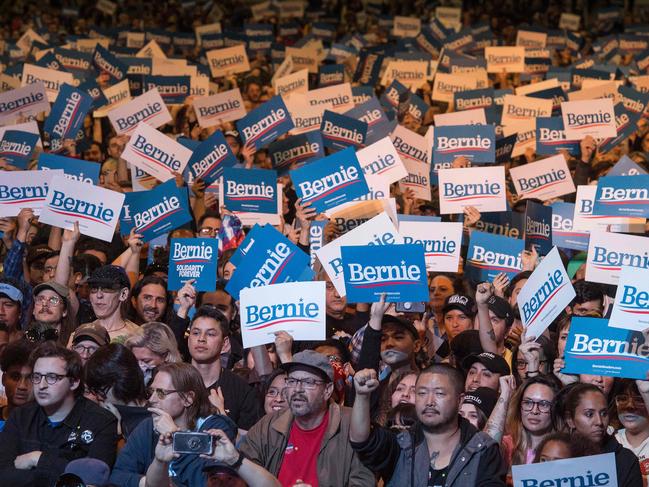
Many previous primaries have been decided by Super Tuesday, but Democrats are struggling to unite behind a candidate who can helm and reshape a party in the midst of an identity crisis, and in the absence of a conclusive result today the contest could well stretch on.
Some see the worst case scenario as a “contested convention”, where July’s Democratic Convention in Milwaukee is the scene of the final, bitter vote for a candidate.
This would see party still consumed with primary politics long after it should have pivoted to general election mode and meeting its biggest challenge: to beat Mr Trump in November.
MORE NEWS
Aussies to avoid kissing as infection spreads
Taliban bins Trump’s peace deal
Boris, Carrie expecting first child
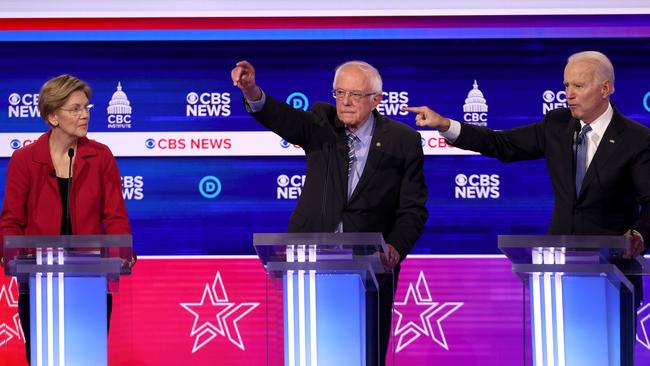
WHO VOTES ON SUPER TUESDAY?
14 states, one territory (American Samoa) and Democrats Abroad (absentee votes)
The states are:
Alabama, Arkansas, California, Colorado, Maine, Massachusetts, Minnesota, North Carolina, Oklahoma, Tennessee, Texas, Utah, Vermont, Virginia.
One-third of the delegates will be decided and one third of those will come from California, which has moved up to Super Tuesday (from June) for the first time.
Polls close first in Vermont and Virginia at 7pm local time (11am Wednesday AEDT) and last in California at 8pm local time (3pm AEDT).
WHO ARE THE CANDIDATES INVOLVED AND WHAT DO THEY STAND FOR?
BERNIE SANDERS: The US senator from Vermont with an impassioned following is making a second attempt at the presidency and secured a position as front-runner after the first nominating contests.
Sanders won New Hampshire and Nevada, finished a close second in Iowa to Buttigieg and well behind Joe Biden in South Carolina.
As in his first presidential run in 2016, Sanders, 78, has campaigned as an unapologetic, self described democratic socialist who seeks nothing less than a political revolution.
Sanders, whose signature issue is government-run universal healthcare, has again proven to be a fundraising powerhouse, leading the field in terms of total campaign contributions.
JOE BIDEN: Biden, who was vice president under President Barack Obama, built his candidacy on the argument that his more than 40 years in elected office makes him best suited to take over from Trump on Day One.
Lacklustre performances in Iowa and New Hampshire cost Biden his front-runner status, though his campaign argued Nevada and South Carolina would be a better test of his ability to assemble a diverse coalition of supporters that includes African-Americans, Hispanics and working-class white voters. Biden finished second in Nevada and a decisive first in South Carolina. At 77, questions persist about his age and his moderate brand of politics, which progressives contend is out of step with the leftward shift of the party. Trump’s apparent effort to push the Ukrainian government to investigate Biden and his son Hunter, which resulted in Trump’s impeachment, appeared to boost Biden’s argument that the president views him as a threat.
MICHAEL BLOOMBERG: Media mogul and former New York City Mayor Bloomberg, 77, announced his candidacy in November, very late in the game.
In an unusual move, Bloomberg is skipping early voting states, focusing instead on the larger states such as California, Florida and Texas that vote on March 3 - Super Tuesday - and beyond.
Ranked by Forbes as the eighth-richest American with an estimated worth of $US53.4 billion ($A81.6 billion), Bloomberg has previously been praised within the party for his advocacy and philanthropy on climate change and in fighting gun violence. He served as mayor of New York from 2002 to 2013.
Bloomberg has poured hundreds of millions of dollars of his own wealth into trying to win the nomination, spending millions on television advertisements.
ELIZABETH WARREN: The 70-year-old US senator from Massachusetts saw her standing in opinion polls skyrocket and then fade in the months leading up to the early primary contests. Warren finished third in Iowa, is likely to finish fifth in South Carolina, and was fourth in Nevada and New Hampshire, which neighbours her home state. A fierce critic of Wall Street, she has based her campaign on a populist anti- corruption message and argues the country needs “big, structural change.” Despite her liberalism, she has been criticised by some progressives for not fully embracing the “Medicare for All” healthcare plan that would eliminate private insurance in favour of a government-run plan. Some moderates, on the other hand, view her policies, which include a tax on the super-rich, as too extreme.
Even so, Warren contends that she is the best candidate to unite the party’s warring moderate and progressive factions.
TULSI GABBARD: The Samoan-American congresswoman from Hawaii is the first Hindu to serve in the US House of Representatives and has centred her campaign on her anti-war stance.
Despite finishing in all four early primary states near the bottom of the heap, Gabbard, an Iraq war veteran, has vowed to continue to campaign. Gabbard’s populist, anti-war approach has won her fans among both the far left and the far right.
Gabbard, 38, has been engaged in a public feud with 2016 Democratic presidential nominee Hillary Clinton. She sued Clinton for defamation, seeking at least $US50 million ($A76 million) in damages for suggesting last year that one of the party’s White House contenders was a “Russian asset.”
WHAT DO CURRENT POLLS SAY?
Far-left candidate Bernie Sanders has recently had a comfortable lead in a number of polls, according to The New York Times.
Mr Sanders was shown to be leading all of his rivals by a 2 to 1 margin in a poll released on Friday by the Los Angeles Times and the University of California Berkeley Institute of Governmental Studies.
That same poll showed Elizabeth Warren was lagging behind in second place at 17 per cent.
The New York Times reports a separate poll by the Public Policy Institute of California found Joe Biden in a distant second, followed closely by Ms Warren and Mike Bloomberg.
WHAT HAPPENS NEXT AND WHAT DOES IT MEAN FOR DONALD TRUMP
Polling for the Democratic presidential nomination will continues in other US states. But if one candidate emerges as a clear favourite following Super Tuesday, US President Donald Trump should have a cleared idea of who he will be up against at the November 3 election.
Super Tuesday could also be the end of the line for candidates who have polled poorly in previous states. If they don’t get a sizeable number of Super Tuesday delegates, it’s unlikely they’ll achieve a pledged delegate majority.
WHEN IS IT, AND HOW CAN I WATCH IN AUSTRALIA?
Sky News will provide Super Tuesday coverage from on Wednesday, 10.30am AEDT, and it will also be streamed across News Corp websites.
- with staff writers and wires
